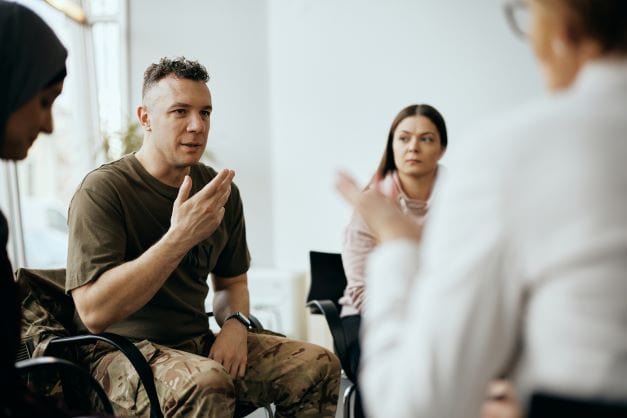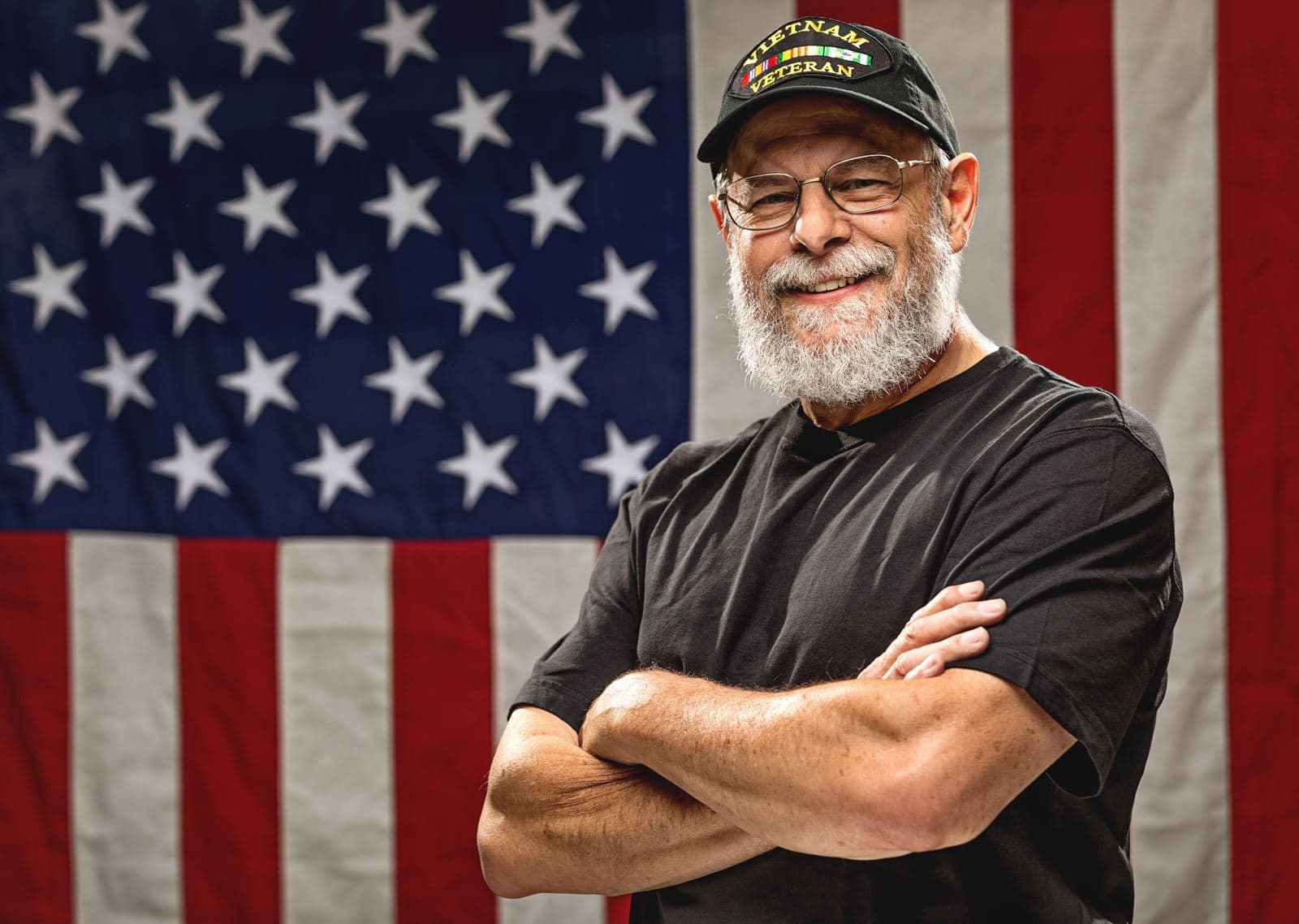We owe a great deal to our nation’s veterans, who experience substance use problems at a rate that is over 2X as that of the general population. There are several underlying factors that contribute to this.
Many Veterans use drugs and alcohol as a coping method in an effort to cope with the challenging memories and traumatic experiences of witnessing combat from the front lines. One study that used information from the U.S. Department of Veterans Affairs found that 11% of veterans from the conflicts in Iraq and Afghanistan had diagnoses of drug addiction disorders (VA).
According to the National Institute on Drug Abuse, alcohol consumption accounts for 65% of veterans who seek drug abuse services, which is more than twice the national rate. Veterans of the military frequently experience chronic pain, and many of them turn to opioid drugs to treat it. There is a chance that these medications will lead to addiction, overdose, or a switch to illegal drug use.
PTSD is Widespread in the Veteran Community
Post-traumatic stress disorder (PTSD), which is brought on by experiencing stressful situations (like combat) affects 13% of veterans.
Long-lasting repercussions of PTSD symptoms include:
- Irritability
- Flashbacks
- Fear of being reminded of unpleasant experiences
PTSD and addiction are linked, as some ex-soldiers use alcohol or drugs as self-medication to treat their PTSD symptoms. Veterans often self-medicate with drugs or alcohol to lessen the distressing emotions that PTSD causes. Veterans who have PTSD consequently struggle more to overcome their substance addiction.
A little over 27% of Veterans receiving VA treatments for PTSD also have a substance use disorder (SUD). Co-occurring disorders are those in which a substance use disorder (SUD) and PTSD both occur at the same time. It is more challenging to treat PTSD and addiction together than to treat either alone. Therapies that target both PTSD and addiction simultaneously produce better results than merely treating one or the other.
Getting Rid of Chronic Pain
Overcoming Chronic pain, sometimes known as “pain management,” is closely linked to the opioid pandemic that is ravaging our country. Many people with opioid use disorder (OUD) first began taking painkillers following an injury or surgery.
Many veterans suffer from wounds, and some may struggle with addiction in an effort to cope with their persistent suffering. Historically, the military culture has minimized addressing suffering (although that is changing). There is a dearth of research on how veterans create coping skills to deal with chronic pain.
Chronic Pain Management without Medications
There are programs to assist veterans in managing chronic pain without turning to medication. Using drugs to cope with pain is ultimately a temporary fix that comes with a number of drawbacks. This type of “therapy” may result in issues like OUD.
Tips for Reducing the Symptoms of Chronic Pain
Here are some non-drug methods for coping with and reducing the chronic pain experienced by veterans:
- Breathe in before the agony begins.
- Regularly move your body
- Use muscle-stretching and strengthening exercises.
- Get massage treatment
- Use the heat-and-cold method
- Make wholesome food selections
- Limit your consumption of alcohol, cigarettes, and coffee
- Engage in the things you enjoy
- Join a network of veterans with chronic pain for support
- Get in touch with your heart rate and how your body responds to stress with biofeedback
This is merely a brief list of strategies that can assist veterans in managing their chronic pain “holistically” (without addictive substances).
Prescription of Drugs for Addiction Issues
There are some drugs that can be used to help treat substance use disorders, which may seem counter-intuitive. Studies have revealed that thanks to these pharmaceuticals, recovery rates from addiction are at an all-time high, even if it is possible that these medications could potentially be habit-forming. The risk associated with these drugs is also lower than that of narcotics like alcohol or opioids.
Addiction Treatment With Medication
The availability and effectiveness of drugs that lessen withdrawal symptoms from drugs like opiates and alcohol have undergone a revolution. Prescription pharmaceuticals like Suboxone, Subutex, and Vivitrol will lessen the desire to abuse alcohol or other substances.
Non-Addictive Anti-Anxiety Drugs
To reduce the danger of addiction to these drugs, doctors frequently prescribe non-addictive anxiety medications like Paxil or Zoloft to veterans with post-traumatic stress disorder (PTSD).
Sedatives
A Veteran’s ability to sleep soundly can greatly contribute to their sense of wellbeing. For this reason, “low-risk” sleep medications like Lunesta and Ambien are frequently prescribed.
Veterans Should Access their Support System More
Veterans can benefit from their support network when seeking addiction treatment. Traditional inpatient and outpatient treatment programs can be obtained at little to no cost from their local veteran’s administration (or V.A.).
The VA can also offer additional programs like family, group, or individual counseling to assist with addiction (and PTSD).
Veterans now have access to more and better therapies than ever before thanks to recent developments in therapeutic interventions and the extensive training of mental health professionals, including:
The most successful treatments for SUD have been found to include:
- Cognitive Processing Therapy (CPT)
- Eye Movement Desensitization and Reprocessing (EMDR)
- Prolonged Exposure (PE)
- Cognitive Behavioral Therapy (CBT)
- Contingency Management
An individual should have a customized blend of methods used in a treatment program to best suit their needs.
Getting Rid of the Stigma Against Mental Health Support
The heartbreaking numbers mentioned above highlight just a few of the challenges experienced by veterans of the armed forces. Many people who have a Veteran in their life ask me for advice on how to persuade them to accept assistance.
Many times, troops find it difficult to recognize they have a problem, even though doing so is a must for accepting the necessary aid that is offered.
Sadly, there is still a lot of stigma associated with seeking treatment for mental, emotional, and drug misuse problems. There are groups offering assistance, but veterans frequently find it difficult to take use of these programs, frequently due to a lack of social support or a fear of being judged.
Veterans are instilled with the warrior mentality of self-sufficiency and the spirit of “never say die” beginning in basic training and continuing throughout their military service. Even the Army is facing legal action because of its long-standing policy of dishonorably releasing veterans with substance use disorders.
What Can You Do To Support Our Troops?
Here are some actions you may take to support a veteran in your life if you have concerns:
Inquire about their wellbeing. Ask if you have any concerns about someone’s usage of drugs or alcohol, any behavioral changes, or general mental health. One straightforward query: “How are you really?” can serve as a starting point for ending the stigma surrounding mental illness and drug use.
Invite them to join you at a support group or meeting. Going to a group or meeting with a friend can help ease the dread or resistance that many individuals experience while seeking help.
Tell them you’re here for them. Despite social media’s increased popularity, loneliness is still a major problem. 52% of Americans say they feel lonely, and nearly as many say they don’t have any meaningful relationships in their life. Making your friend or loved one aware of your support can be really beneficial.
Introducing them to resources. In actuality, you can’t make someone ask for assistance if they don’t want to. However, you can give them the resources and tools if they decide to use them.
Resources For Veterans With Substance Abuse And Mental Illness
For war veterans who require assistance with substance misuse and mental health, there are resources available:
Veterans can contact the U.S. Department of Veterans Affairs’ 24-hour crisis line by dialing 988 and pressing 1, texting (838255), or opening an online support ticket. The Crisis Line website has a search feature that can be used to identify nearby resources for substance misuse and mental health.
The VA also offers a selection of mobile coaching and support apps for issues relating to substance abuse and mental health.
For people looking for support and recommendations, the Substance Abuse and Mental Health Services Administration offers a free, round-the-clock hotline. You can reach them at 1-800-622-4357.
For veterans struggling with suicidal and mental health ideation, Stop Soldier Suicide has options available.Of course, you should dial 911 if you are concerned about the immediate health and safety of a loved one.
Start Right Now
Veterans who suffer from severe PTSD or a substance use disorder (SUD) must get help right now. Since these symptoms progress and hardly ever go away on their own, there is no need to wait. Contact a local VA health care provider to get started.




[…] account for statistically elevated costs of homelessness, suicide, psychological nicely being, and substance abuse points than the general […]